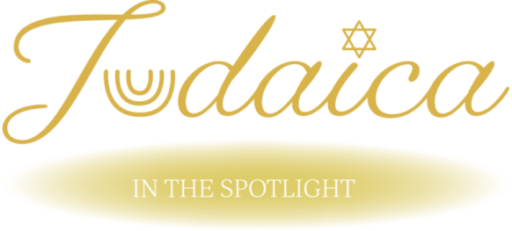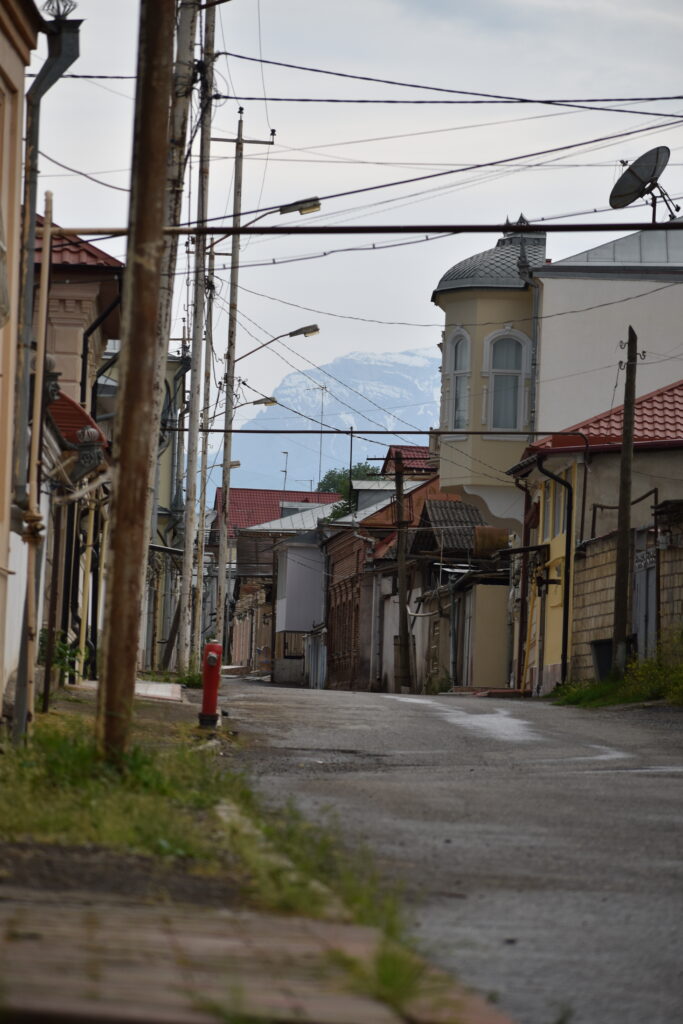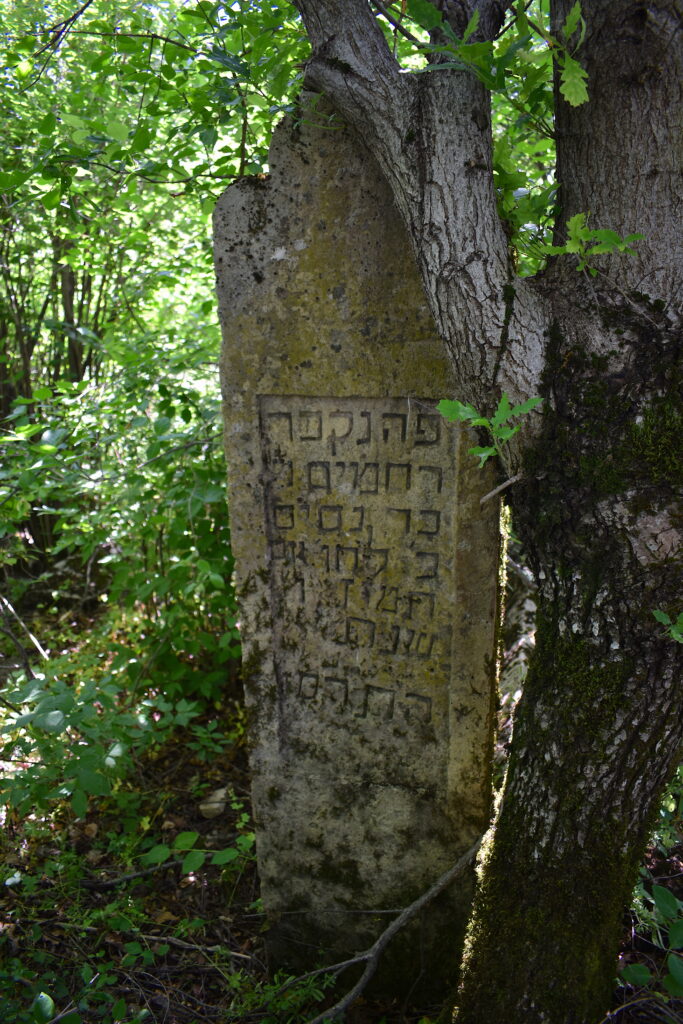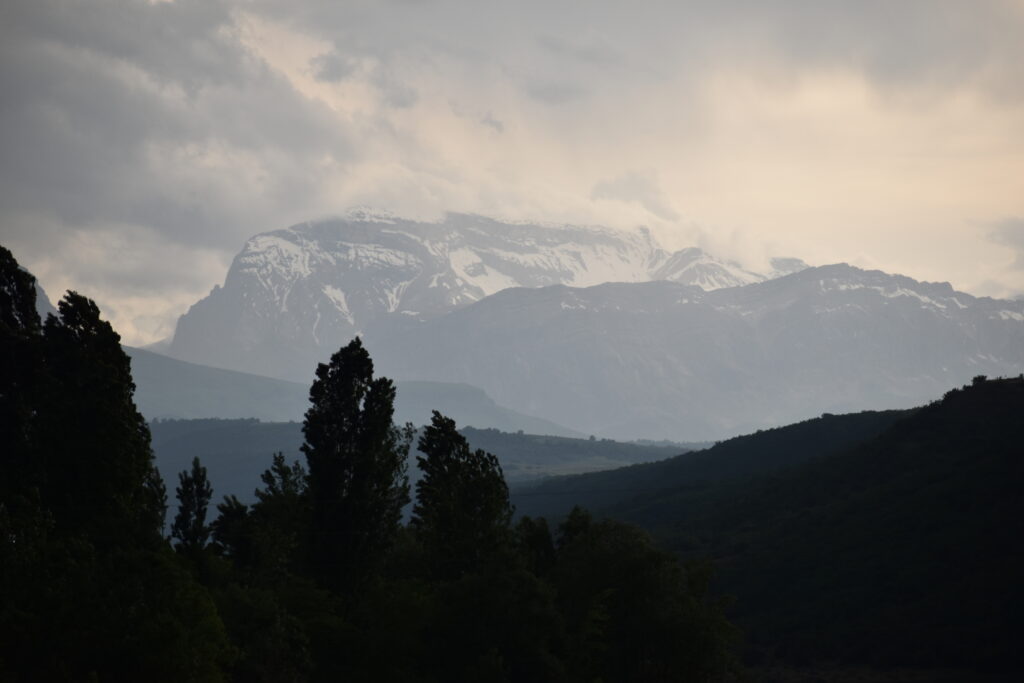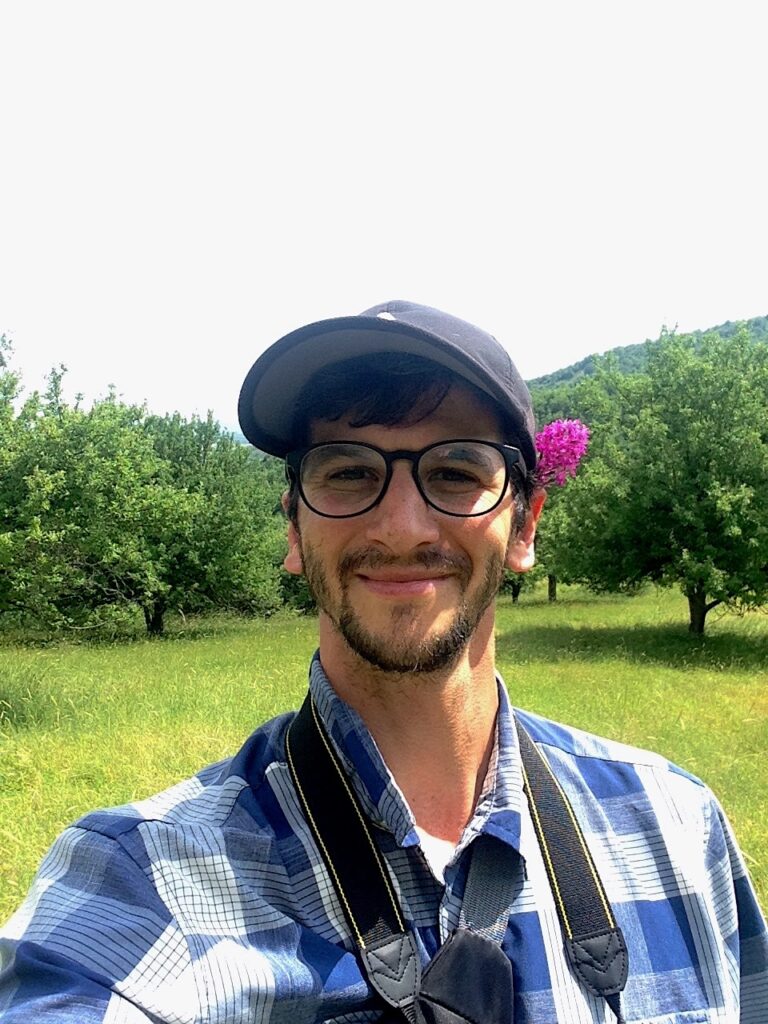
Born in Israel to American parents, raised in the remote woods of Northern California by an outdoor loving rabbi/professor father and music educator mother, Arieh David Scharnberg was brought into this world with diversity and variety as a default. Since graduating Prescott College in 2003, with a degree in Environmental Studies, where he completed a senior thesis project on Shmittah in the modern Jewish State, he has slowly built a career where jobs taken to make ends meet have combined with opportunities to follow his passions, all of which have culminated in shaping him to the place he is today: a Jewish heritage adventure explorer and guide, an activist, and lover of all things cultural, passionate about his connection to the Land of Israel, and a devotee of all ways of spiritual knowledge, while constantly rooted in a Jewish path. He currently resides in Baku, Azerbaijan, guiding, documenting Jewish heritage and history, and climbing mountains in his spare time.
Tell us a little bit about yourself and your background.
I was born in Israel to American parents. My father is a liberal, unaffiliated rabbi; my mother is a music educator in public schools. We moved, when I was five, to a fairly remote region of Northern California, where my father became a Reform congregational rabbi, and a university professor. I think it is fair to say that I’m clearly a mix of both of my parents. I grew up as an only child, although I do have a half-sister, who I love dearly, and who would visit in the summertime. Our house was situated in its own valley, surrounded by deep temperate rainforest. While childhood always has its challenges, in many ways mine was rather idyllic in many respects. My father and mother are both outdoor adventurers, my father leaning to the more extreme side, so I developed a love for nature and became an adept outdoorsman from an early age. As they were both educators, we went every summer on an extensive family-backpacking trip and often this would involve summiting some remote mountain peak.
I’m also a musician and love the arts in general. I started playing the violin at age 4 and my parents would regularly read me classic novels and poetry. I think it was my father’s decision to chart the course of the Nautilus on a world map in my room as he read me 20,000 Leagues Under the Sea at age 6 that inspired my love of geography. Music trained my ear and I think helped me, as I’ve travelled, in learning languages. I speak three languages decently and several others to a basic level.
I left most of my connection to Judaism behind after my Bar Mitzvah, but at age 19, after losing a dear friend I, for reasons still unknown to me, decided to buy a four-month plane ticket to Israel to go on a ‘spiritual pilgrimage.’ While I was very much turned off by the Jerusalem ‘ba’al tshuvah’ scene, I still found that keeping Shabbat was deeply nurturing and stabilizing amidst my vagabond uncertainties, and thus began my journey that I half-jokingly call ‘zorem l’tshuvah’ (flowing to repentance).
Also, having grown up in remote Northern California so connected to a beautiful land that was steeped in the heritage of the native peoples, who still inhabit the region, I found a deep sense that I, too, have an indigenous spiritual heritage that connects to a beautiful land and became inspired by the idea of living that out in Israel. In 2012, a few months before my 27th birthday, I moved to Israel. It has been a challenging journey, which has taken me through various types of employment and emotional experiences. When people ask if I ‘like living in Israel’ I reply I don’t know about ‘like’ but it is definitely fulfilling in that it contains the full range of human emotion: infuriating and saddening to the utmost highest inspiration and joy.
What inspired you to start your business?
Having grown up as a rural Jew with an outdoor adventuring family, I’d always heard about the ‘Mountain Jews.’ I had dreams of a rural pastoral life in some alpage with a simple stone synagogue surrounded by snowy peaks.
Three years ago, I was hired at Tel Aviv University’s (TAU) Porter School for the Environment and Earth Sciences, where I wore a variety of hats. One of my projects included co-coordination with Columbia University’s Earth Institute on a cross-border environmental study tour that explored environmental management issues between Jordan, Israel, and the Palestinian Authority during an intensive two-week travel experience in the region. It was inspiring to see the meaningful impact that creating an academic tour experience had on the participants.
Also, at TAU I came in contact with a group of Muslim and Jewish students who were holding a comparative text study group. This group received an invitation through an Erasmus + sponsored program to attend the Islamic Solidarity Games being hosted in Baku two years ago to see how sports can build bridges and I joined. Knowing that Azerbaijan was one of the locations of the fabled Mountain Jews, I did some research before arriving and understood that there was a village in the north of the country and convinced some people in my group that we should take a day trip up there.
There I stood, with Jewish and Muslim companions, in an all-Jewish town founded at the invitation of a Muslim ruler 350 years ago across the river from the former capital city at the foot of 4000-meter peaks and I just felt like I had found my dream location. After a very successful environmental study tour, I came back to Azerbaijan to explore what it would take to create a meaningful, in-depth tour experience for people.
Last year (2018), I guided a wonderful group of eight absolutely brilliant people on a week-long exploration of northern Azerbaijan, combining a Shabbat experience in the Jewish village with trekking in the local mountains. To my knowledge, despite the increasing popularity of Jewish tourism to the country, we are the only tour group to have actually stayed in the village for Shabbat.
This brings me to my other current job, which is working for Diarna. Diarna is an initiative of Digital Heritage Mapping Inc, an independent organization which partners with the American Sephardi Federation researching communities in the Middle East and Northern Africa in the wake of the anti-cultural forces arising in the Middle East that have been wiping out cultural heritage of all kinds, deeply threatening important Jewish heritage sites throughout the region. They heard about my passion for this region and we saw a synergy between the goals of my travel company and their goals in documenting Jewish heritage in Azerbaijan to a deep and meaningful level.
What do you love the most about your job?
I love working for Diarna because it allows me to travel in a way that is so unique. I am invited into people’s homes, I get to build personal connections, and I am getting to document sites and stories that are essential elements of the rich tapestry of Jewish diasporic experience. Ultimately, I get to experience things that I think people rarely get to and I feel honored and blessed for the privilege.
I love working in my tour company because I think I provide people with an experience that is beyond a typical pile on and off a bus and take pictures type experience. It means so much to me to see people connect to a place in a way that takes them beyond preconceptions and allows for our all of our worldviews to be enhanced. Also, I just love the challenges of group dynamics and seeing how to manage and integrate everyone, as all of this is a micro and macrocosm of the complicated dynamics of life, where diversity is at the root of so much tension and conflict and yet is the essence of a healthy individual’s ability to relate to the world and the basis of a healthy society.
You offer week-long Jewish heritage tours to remote regions of Azerbaijan. What fascinates you the most about the country?
The reason I chose to focus on Azerbaijan is the rich, long history of Jewish-Muslim relations here. Everywhere I go, there are so many people, from urban Bakuvians, to rural farmers and shepherds, genuinely excited to speak with someone Jewish and proud of their long, active history of positive relationships with Jews. While I think it is essential that we continue to tell the stories of diaspora in many regions of the world, I really appreciate how the narrative here presents such an alternative to our dominant narrative of constant persecution. Instead, it is more often a narrative of the Jewish people been given a safe-haven, being free to live their lives. When tragedy struck the Jewish people, it usually befell the entirety of the indigenous population at the hands of a foreign oppressor. And, on a simpler level, while hardly a group of Jewish alpinists, the geographic proximity to the mountains definitely influences the Jewish people here, especially in the villages, where many express their love of the land here and their love of open spaces and nature. You can find that in other Jewish communities, but it is definitely not the predominant Ashkenazi urban identity here. That is often rare in Jewish societies and despite the many linguistic and cultural gaps, makes me feel a special affinity.
Can you tell us a little bit about the local Jewish community? Have you learned anything unexpected in any of the places you are touring?
I think I’ve already covered some of this and I have much more time yet to spend here to deepen my knowledge. So, I hesitate to share about things like Tisha B’Av, which I’ve heard is a unique experience where everyone in the village goes out to the gravestones of their deceased relatives as I’ve yet to share that experience in person with the local communities.
It is fascinating that they managed to preserve their unique language, Juhuri, despite the more than 1500 years since leaving ancient Persia, the root of the language, and despite many waves of invaders who sought to homogenize the local cultures. You can still hear it spoken in the streets in Qirmizi Qasaba and even in Baku, at the local Mountain Jewish temple, they auction aliyot to the Torah on Shabbat in Juhuri, so I have yet to be able to participate or be called for an aliyah. Ha!
Also, there is a very little known community in the south, with 25 remaining members, a group called Subbotniks, Russians who converted in the early 19th century and were expelled by the Tzar. They established a series of villages in far southern Azerbaijan, close to the Iranian border. What surprised me most was that despite being in Azerbaijan for around 200 years, members of the community only speak Russian. I don’t really speak either Azeri or Russian, so I work with a translator, but my knowledge of Azeri language was more than the 80+ year old man who readily invited us into our home immediately upon meeting me and my translator.
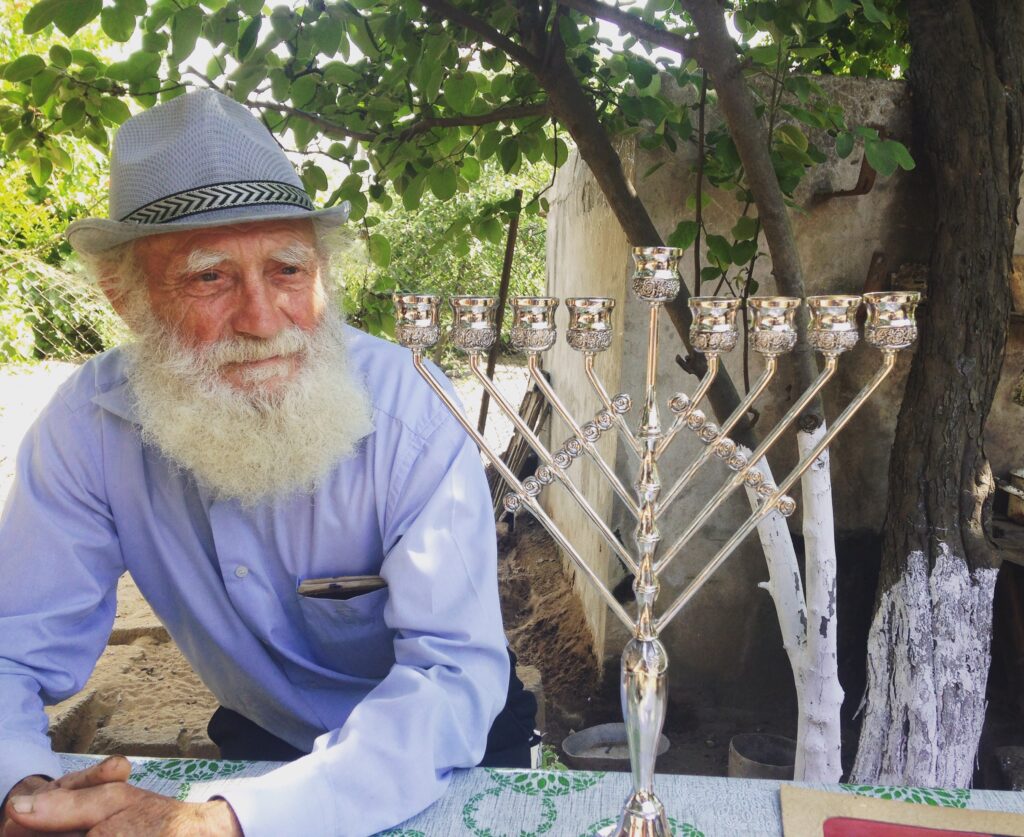
What is your favourite place to tour?
The classic place is the Quba region. This is where the ‘Red Settlement’ village is, the most famous Jewish village, set at the foot of spectacular 4000-meter peaks along a riverbank. It is kind of a bizarre place in that it combines an almost shtetl feel with extravagant wealth of members of the community who have left and made their fortunes primarily in Moscow. Above this is the mountain region, where unique ethnic groups speak obscure languages that linguists say stems from the time of the Caucasian Albanian Kingdom(s) (6th century BCE-8th century CE) and have been preserved in these remote pockets. In one village, they tell a 1500+ year old story of the Jewish people seeking a safe haven in their remote village and living together for hundreds of years high in the mountains with other Jews. One of the elders in the village, Sheikbaba, always seems glad to see me and meet Jewish people.
But, I have also really become enamoured with the south and hope to explore it more on another trip back to visit the Subbotniks. There is something a bit more pastoral, but also more wild and I have yet to explore them in-depth but I’ve read that the local Talysh mountains, in which the ethnic group the Talysh people live, is a haven for incredible flora and fauna, some of it endemic and which pre-date the Pleistocene.
Do you offer tailored tours within Azerbaijan?
I am happy to take anyone willing to go beyond the standard tour model and really take a solid week or more to go in-depth into a region with me. I love sharing this knowledge and for those with a bit of an adventurous spirit, I can myself, and with local partners, bring people to have very unique travel experiences here. I have pre-organized tours, but I also am happy to create something that caters to people’s particular interest, so long as those interests generally encompass history, anthropology, unique cultural craft-making, and adventure travel such as hiking, climbing, and generally going off the beaten path.
What advice would you give an aspiring tour guide?
Oh, that is a hard one. I have several years of guiding experience under my belt, having also been a hiking guide in Switzerland and in the USA, but I hesitate to call myself someone who is in a position to hand out too much advice. I think the most important message I’d say is a more general, philosophical appeal, that anyone working in this industry seek to be aware of the ways in which our business seeks to promote and has the capacity to undermine the very cultural fabric we are so keen to share. I hope that anyone coming to Azerbaijan or any place where this unique, rich cultural diversity, will find the balance between the fact that we are running a business but that our business is based fundamentally on things like ancient history, cultural identities, and the very core elements that make up the richness and beauty of human existence. It is a tension point for me the fact that I am seeking to commodify the ‘soul’ of individuals and their societies. So, I hope and ask, to myself and everyone else, let us tread lightly, let us honor and respect the very source of our livelihood, and let us become active partners in using our capacities as business people who benefit from these people and places, to constantly ask how we can be involved in the genuine promotion and preservation of the rich fabric of cultural diversity that is the very reason why we have the privilege to bring people to experience such wonder and beauty.
What are your wishes for the future?
It would be great to build this idea out to a few destinations and be able to employ a few high-quality people to work with me. Right now, I’m doing everything myself: business management, logistics, marketing, sales, and, while I have local partners, the bulk of the guiding. I’d love to be able to focus on the historical research and the guiding part of the business and some general visioning and management.
The dream is to have a theme: remote regions of Jewish diaspora, predominantly in Muslim majority countries, to explore their histories and current lives and combine that with adventure travel, working with local partners to help strengthen cultural and economic sustainability for local rural regions. I would be delighted to create my own travel itineraries based on these themes, but have already begun working with the Azerbaijan Tourism Board to assist them in developing this concept in general for the country, and could see myself continuing to pursue such governmental co-operation, as I think at that level of ability to help, I ensure that my passion for cultural preservation and integrity becomes a part of a larger framework than just my own business.
I have heard of remote valleys in the Tien Shan mountains where Jews have lived for hundreds of years. I am fascinated by Bosnian Jewish history. And, while not entirely in the theme, I am very keen to link the three Caucasus countries as all three have extensive, under documented, Jewish history.
Where can we find out more about your business and how can we book you?
As I do everything myself, my online presence is limited.
I have three main ways people can connect and see my work:
Instagram: mountain_yid
Facebook: Moreshet Adventure Consultants
E-mail: [email protected]
